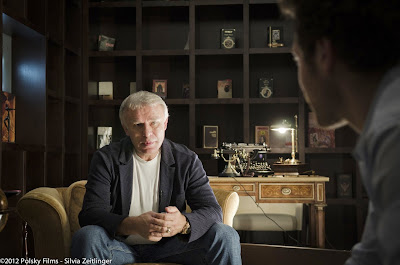Some movies try to succeed by mixing star power, glamor and gimmickry. That's pretty much the case with Focus, a con-artist/caper movie starring Will Smith and Margot Robbie.
In case it's not already clear, Smith provides the marquee allure, and Robbie, the glamor. A plot full of twists and turns accounts for the gimmickry.
Smith, of course, needs no introduction, although his last movie, After Earth, hardly set the world on fire. You may remember Robbie as the knock-out Australian actress who played Leonardo DiCaprio's wife in The Wolf of Wall Street.
Focus puts me in a position that comes up often enough, especially during a time of year when Hollywood isn't firing its big artillery.
The movie by no means qualifies as a painful experience. Focus proves sleek and seldom boring, and both Smith and Robbie are plenty watchable.
But while its flaws aren't entirely off-putting, Focus is burdened by too many scenes that leave us thinking,"Did anyone really expect us to believe this?"
Now, for the plot: Smith's Nicky is a con man who takes an aspiring con woman -- Robbie's Jess -- under wing. After giving Jess a few quick lessons in how to be a pickpocket, Nicky heads to New Orleans to work a major sporting event that looks an awful lot like a Super Bowl.
Wanting in on the action, an uninvited Jess follows Nicky to New Orleans, where he has assembled a large staff of felons that deals in a high volume of stolen merchandise. Nicky's minions pilfer on the streets of New Orleans, raking in more than $1 million in loot during Super Bowl week.
We see all this in an energetic sequence that illustrates the movie's title. Skilled thieves employ misdirection; i.e., a victim focuses attention on one thing while a wily thief makes off with another.
The highlight of the New Orleans trip arrives when Nicky and Jess attend the big game. Nicky gets into an escalating betting contest with a rich and apparently reckless Chinese gambler (BD Wong).
Although the scene builds tension, the explanation of what has happened -- revealed in a series of fleet flashbacks -- goes way beyond far-fetched.
It doesn't require much foresight to predict that Nicky and Jess will ignite romantic sparks, but Nicky abruptly puts the kibosh on love, explaining that there's no room for feeling in his line of work.
Once his business in New Orleans concludes, Nicky gives Jess the cold shoulder. He tells her to move on.
The movie then leaps ahead three years. Nicky is working a new con in Buenos Aires. He's being paid by the wealthy owner of a Formula One race car (Rodrigo Santoro) to sabotage a rival owner.
So, guess who shows up in Buenos Aires? If you said Jess, you're a winner. Predictably, her presence complicates Nicky's life.
In the movie's smaller roles, Gerald McRaney stands out as an enforcer who works for Santoro's character. Adrian Martinez is equally good as one of Nicky's cohorts, a disheveled, curly haired mess of a man who provides comic relief.
Focus -- from the writing/directing duo of Glenn Ficarra and John Requa -- does an OK job of making us wonder who's conning whom, but earns no real genre distinction.
That may result -- at least in part -- from the fact that those who are conned in this movie aren't necessarily deserving targets. Are we supposed to enjoy watching ordinary people become the victims of pickpockets?
And unlike The Sting -- considered by some to be the greatest of all con movies -- the writing isn't nearly intricate or spry enough to leave us smiling. Smoothly assembled but negligible, Focus doesn't have a whole lot of weight.













